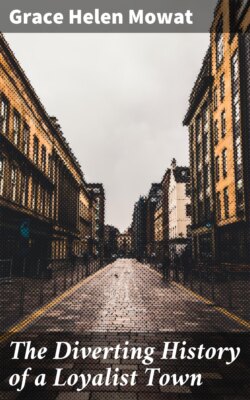Читать книгу The Diverting History of a Loyalist Town - Grace Helen Mowat - Страница 7
На сайте Литреса книга снята с продажи.
3
FOR KING AND COUNTRY
ОглавлениеTable of Contents
In reading over letters of this interesting period, we find ourselves modifying our attitude towards George III. We are so accustomed to hearing of him as the “cruel tyrant” of the American school book, and just as frequently English historians will represent him as the “stubborn monarch” who lost the Colonies for Britain. He was always the unfortunate peg on which both sides hung the responsibilities of the revolution. Poor simple-minded old King, with his supercilious ministers and his profligate sons. He was deeply touched by the tales from over the sea of loyal subjects who would sacrifice all for king and country. His kind heart grieved for their sufferings. His only tyranny was to insist that their persecutors be disciplined. Can he be blamed for that, when tales came back from overseas that these loyal subjects were robbed, insulted, thrown into filthy prisons, even at times used as slaves—tales of wanton destruction of property that were hailed as heroic patriotism? How could those rebels expect representation, liberty, or anything else?
The attitude of the Loyalists to the King is expressed in a letter of Johanathan Sewell’s, written from England in 1778,[A] in which he says he has both laughed and wept over his friend’s letter, describing conditions in the Colonies. “Faith, I’ll enclose it to Lord North to be communicated to His Majesty in private, and yet, God bless his good soul, why should I wish to make him cry? It is no fault of his this cursed rebellion was not suppressed long ago, unless you call mercy and tenderness in the extreme a fault.”
[Footnote A: Winslow papers.]
The King also showed a royal sporting spirit when everything was over and the Treaty of Paris signed. When his gracious Majesty admitted John Adams to his Royal presence he said: “Sir, I was the last man in England to consent to the independence of the Colonies. Now that you have got it, sir, I shall be the last man to disturb it.” There was no sound of tyranny in that Royal speech.
In contemplating this strange migration of the Loyalists, one thing is very apparent; it solved, in the best possible way, the problem of populating the newly-acquired British North America (then almost wholly French) with an infusion of loyal and most desirable British subjects.
How long before the close of the war far-seeing British leaders had realized this to be the cheapest and easiest way out of a rather hopeless entanglement, it is hard to say; letters at that period were very guarded. Men like Carleton, Cornwallis and Howe saw the hopeless task of subduing the rebel colonies, whose aim was independence, and who were only inflated to further wrath by offers of concessions. Even were they conquered they could not be subdued without a vast amount of troops and money that were sadly needed at home. It would be a wiser investment for England to leave these rebel colonies glorying in their victory, skim off the cream of the population that still remained loyal and remove it to the regions of Acadia, from which the French had lately been expelled. A better solution for their difficulties could never have been devised, and the rebels helped nobly about skimming the cream after the treaty of peace was signed. They organized companies and started societies for the purpose of harassing the Loyalists and driving them out of the country. For any kind of imaginary treason they were proscribed and banished; this, with the memory of ten years of nerve-wracking insecurity, made them thankfully accept offers of new lands in a new country, for they had learned to despise the land that had been their home. In letters of that period we find such sentences as these: “God grant that my next letter to you may be dated in some province rather to the northward of this.” And another Loyalist writes, “As to Massachusetts Bay, I wish it well, but I wish never to see it again.”
So came the Loyalists to those British provinces that had so lately been French—thirty thousand came to the old Acadia or Nova Scotia; others settled along the St. Lawrence and on the shores of the Great Lakes in what was then called Upper Canada.
All of which was known as His Majesty’s possessions in North America. This now forms part of Canada.
